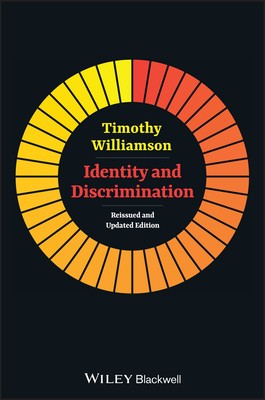
- We will send in 10–14 business days.
- Author: Timothy Williamson
- Publisher: Wiley-Blackwell
- ISBN-10: 1118432592
- ISBN-13: 9781118432594
- Format: 15 x 22.6 x 1.3 cm, softcover
- Language: English
- SAVE -10% with code: EXTRA
Reviews
Description
Identity and DiscriminationThis updated edition of Identity and Discrimination, first published in 1990 and the first book by well-known philosopher Timothy Williamson, is now reissued with the inclusion of significant new material. This major work - influential in philosophy of perception and the theory of vagueness - continues in an original and rigorous way to highlight the necessity of discrimination and the thresholds which determine the approximate criteria of identity.
Williamson's proposal for an original and rigorous theory links identity, a relation central to metaphysics, and indiscriminability, a relation central to epistemology. He provides a distinctive cognitive account of the nature of discrimination, with important applications to the philosophy of perception and the theory of vagueness. The book pioneers the use of epistemic logic to solve the notorious paradoxes of indiscriminability, and develops the application of techniques from mathematical logic to understand issues about identity over time and across possible worlds.
EXTRA 10 % discount with code: EXTRA
The promotion ends in 18d.22:31:35
The discount code is valid when purchasing from 10 €. Discounts do not stack.
- Author: Timothy Williamson
- Publisher: Wiley-Blackwell
- ISBN-10: 1118432592
- ISBN-13: 9781118432594
- Format: 15 x 22.6 x 1.3 cm, softcover
- Language: English English
This updated edition of Identity and Discrimination, first published in 1990 and the first book by well-known philosopher Timothy Williamson, is now reissued with the inclusion of significant new material. This major work - influential in philosophy of perception and the theory of vagueness - continues in an original and rigorous way to highlight the necessity of discrimination and the thresholds which determine the approximate criteria of identity.
Williamson's proposal for an original and rigorous theory links identity, a relation central to metaphysics, and indiscriminability, a relation central to epistemology. He provides a distinctive cognitive account of the nature of discrimination, with important applications to the philosophy of perception and the theory of vagueness. The book pioneers the use of epistemic logic to solve the notorious paradoxes of indiscriminability, and develops the application of techniques from mathematical logic to understand issues about identity over time and across possible worlds.


Reviews